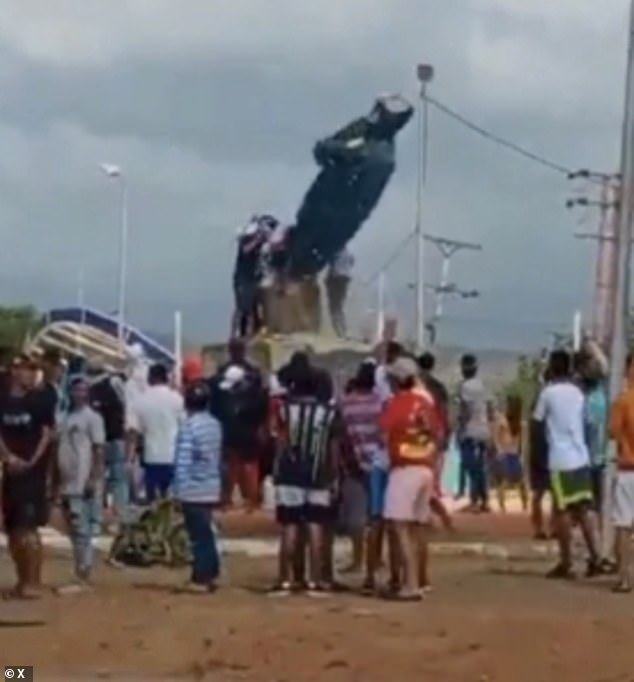Activists in Venezuela have toppled a statue of former President Hugo Chavez amid violent protests over the country’s disputed presidential election.
Chávez served as president of the South American country from 1999 until his death in 2013.
This comes after Marxist dictator Nicolas Maduro, who was previously backed by former Labour leader Jeremy Corbyn, was formally declared the winner of Venezuela’s presidential election.
Images posted on social media show people climbing the statue in the state of Falcón before dramatically toppling it over, as large crowds cheer and raise their hands in the air.
The statue was torn down in protest against Maduro, amid allegations of “serious irregularities in the counting and declared results” of the election.
Images posted on social media show people climbing atop a statue of Hugo Chavez before toppling it over.
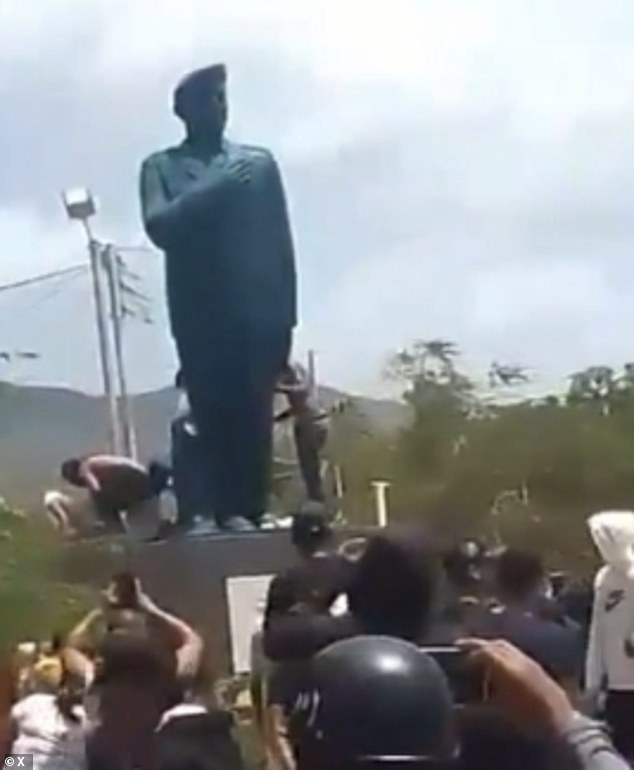
Statue torn down in protest against Nicolás Maduro
The National Electoral Council, loyal to Maduro’s ruling party, announced his victory, granting him a third six-year term as leader of an economy recovering from collapse and a population desperate for change.
Among those in attendance who applauded were the ministers of Defense, Communications, Technology and the head of the National Assembly.
“We have never been motivated by hatred. On the contrary, we have always been victims of the powerful,” Maduro said at the ceremony broadcast on national television.
‘In Venezuela, once again, an attempt is being made to impose a fascist and counterrevolutionary coup d’état.’
“We already know this film and this time there will be no weakness,” he added, assuring that in Venezuela “the law will be respected.”
The opposition, which had vowed to defend its votes, had no immediate comment. Opposition leaders were scheduled to hold a news conference later in the day.
Within hours, a few thousand Venezuelans began taking to the streets near Caracas’ largest slum to protest Maduro’s claim.
In the Petare neighborhood, people began to march and shout against Maduro, and some masked youths tore down his campaign posters hanging on light poles.
Heavily armed security forces were located just a few blocks from the protest, which was peaceful.
“It’s going to fall! It’s going to fall! This government is going to fall!” some of the protesters shouted as they walked.
“He has to go, one way or another,” said Maria Arraez, a 27-year-old hairdresser, as she joined the protest.
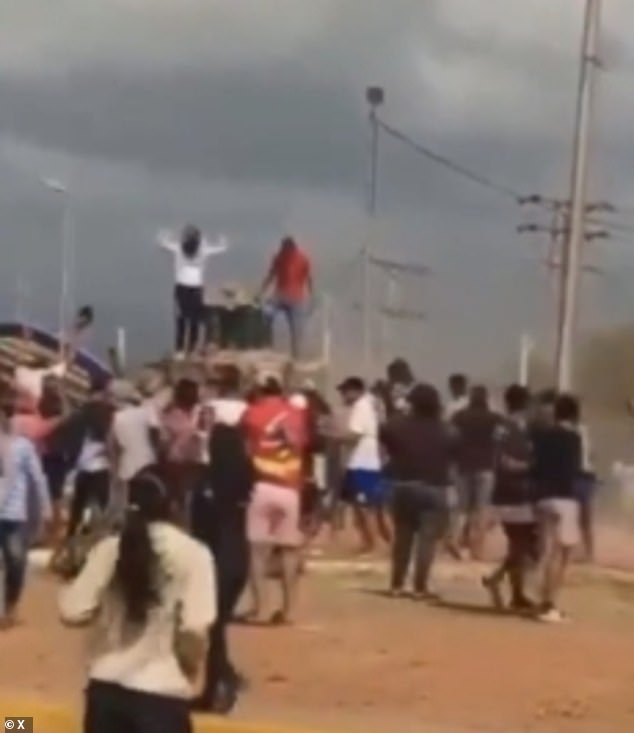
Large crowds cheer and raise their hands in the air after the statue falls.
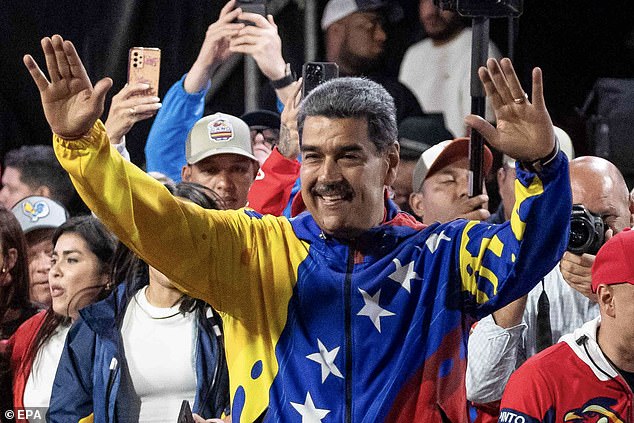
Marxist dictator Nicolás Maduro, who had previously been backed by former Labour leader Jeremy Corbyn, was declared the winner by Venezuela’s electoral body.
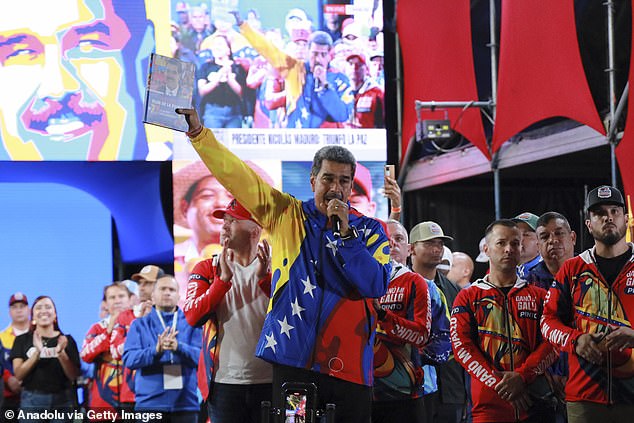
Venezuela’s re-elected President Nicolas Maduro addresses citizens after the results of the presidential election were announced in Caracas, Venezuela, July 29, 2024.
As the crowd marched through another neighborhood, retirees and office workers cheered, banging pots and pans and filming the protest in support. There were some shouts of “freedom” and insults directed at Maduro.
Some protesters tried to block highways, including one connecting the capital to a port city that hosts the country’s main international airport.
Authorities delayed the publication of detailed tallies from Sunday’s election after declaring Nicolas Maduro the winner with 51% of the vote, compared with 44% for retired diplomat Edmundo Gonzalez.
The competing claims pose a high-risk confrontation.
“Venezuelans and the entire world know what happened,” González said.
The opposition vowed to defend its votes, but Gonzalez and his allies urged their supporters to remain calm and called on the government to avoid fuelling the conflict.
Mr Maduro accused unidentified foreign enemies of trying to hack the electoral system.
“This is not the first time they have tried to undermine the peace of the Republic,” he told hundreds of supporters gathered at the presidential palace.
He provided no evidence to back up the claim, but promised “justice” for those trying to foment violence in Venezuela.
Several foreign governments, including the United States and the European Union, have refused to recognise the election results.
Caracas woke up as if it were a holiday, with some businesses closed, bus stops empty and traffic non-existent.
A few hours earlier, around midnight, a mixture of anger, tears and loud banging of pots and pans greeted the announcement of the results by the National Electoral Council controlled by Maduro.
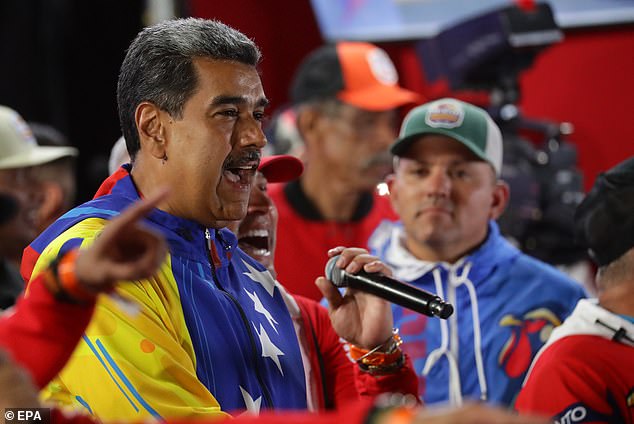
Venezuelan President Nicolas Maduro (left) delivers a speech after the results of the presidential election were announced in Caracas, Venezuela, July 29.
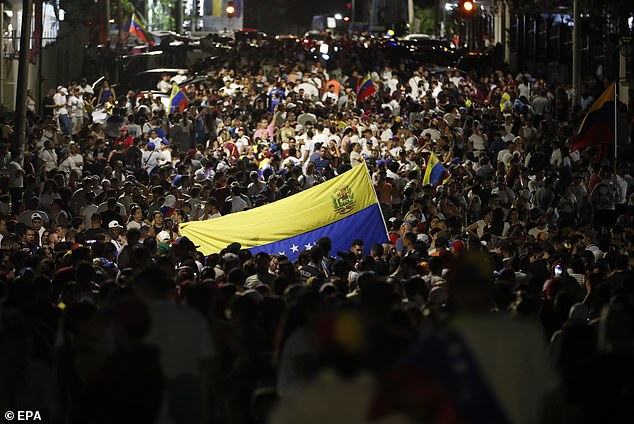
Venezuelan citizens gather to await the results of the presidential elections
As he sat on a bench next to a closed business, Deyvid Cadenas, 28, said he felt cheated.
“The majority voted for the opposition,” said Cadenas, who was voting for the first time in a presidential election. “I don’t believe in yesterday’s results.”
After failing to oust Maduro during three rounds of protests since 2014, the opposition has put its faith in the ballot box.
The election was among the most peaceful on record, reflecting hopes that Venezuela could avoid bloodshed and end 25 years of one-party rule.
The country has the largest oil reserves in the world and once boasted the most advanced economy in Latin America.
But after Maduro took over, the country entered a free fall marked by plummeting oil prices, widespread shortages of basic goods and hyperinflation of 130,000%.
The US oil sanctions sought to force Maduro from power after his 2018 re-election, which dozens of countries condemned as illegitimate.
But the sanctions only accelerated the exodus of some 7.7 million Venezuelans who have fled their crisis-stricken nation.
The opposition’s call for calm partly reflected protest fatigue among voters, who polls show are in no rush to change their lives by taking to the streets as they have done in the past.
Voters lined up before dawn on Sunday to cast their ballots, raising opposition hopes that it was on the verge of breaking Maduro’s grip on power.
The official results came as a surprise to many who had celebrated, online and outside some polling stations, what they believed was a landslide victory for Gonzalez.
Gabriel Boric, Chile’s leftist leader, called the results “hard to believe,” while U.S. Secretary of State Antony Blinken said Washington had “serious concerns” that the announced recount did not reflect the actual votes or the will of the people.
The U.S.-based Carter Center called on Venezuelan authorities to immediately release the tallies from 30,000 individual voting machines from the election.
The Atlanta center sent a small group to Venezuela for the elections.
He said the missing data from polling stations was “crucial to our assessment and important for all Venezuelans.”
Opposition leader Maria Corina Machado said Gonzalez’s margin of victory was “overwhelming,” based on recounts the campaign received from representatives in about 40 percent of the polls.
Authorities have postponed the publication of the results from each of the country’s 30,000 polling stations, promising to do so only in the “next few hours.”
The delay hampered attempts to verify the results.

